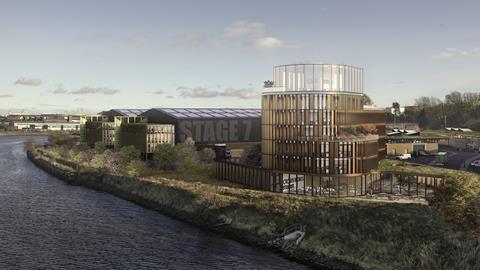 Sponsored content
Sponsored content
Creative Cities Convention director Ruth Pitt says creating a successful screen sector outside the capital requires only four ingredients
Believe the hype around the growth of the screen sector outside London and you could be forgiven for thinking that entire local economies are booming thanks to the single-handed support of entrepreneurial indies, commission-laden broadcasters, local councils with bottomless pockets and government departments bent on levelling up across the UK.
The experience at ground level is a touch more complex and the questions on many lips more challenging. Where’s the new army of talent coming from? Will commissions remain if audiences waver? What role will small local indies play? Are local media degrees aligning with industry need? And the biggest question of all: is the money pouring into the screen industries outside London being wisely spent?
Screen growth is one of the UK’s best success stories and big city planners are clamouring for more. The BFI/Creative England report Screen Business showed that in the two years before the pandemic, film and High-End TV production in the English regions alone rose by 42%, generating more than £900m in GVA (gross valued added) and a 38% increase in jobs.
“The growth of studios is a great litmus test for out-of-London production”
London-centrics who view production outside the capital as a sideshow should finally be silenced. Across the nations and regions, the snowball is gaining record-breaking momentum – but the challenge is to stop it melting away if the climate changes.
Studios boost
The growth of studios is a great litmus test. Bristol’s Bottle Yard Studios has a £12m expansion plan. Belfast’s Studio Ulster promises a £25m virtual production outfit extending to 57,000 sq ft and creating 461 direct and indirect jobs. Bad Wolf Studios in Cardiff, the new Kelvin Hall Studios in Glasgow and Versa’s expansion to Leeds and Manchester all underline the direction of travel.
Now, in Sunderland, Fulwell 73 and Cain International have announced plans for the Crown Works Studio, described by city council leaders as ‘the single most significant development announcement to come out of the North East in decades’ and aiming to create 8,450 jobs in the next decade. The BBC’s promise of £25m in North East commissioning spend over five years should add rocket fuel.

So if you build it, will they come? Investors, indies, broadcasters and politicians are certainly banking on success – a Centre for Cities report claimed that unemployment in North East England is three times worse than official figures suggest.
Other plans abound in North of Tyne and Tees Valley. New jobs literally built on the bones of abandoned industrial sites can bring fresh hope for ravaged communities, but it will take long-term commitment and a recognition that highly skilled talent doesn’t grow on trees.
As the Creative Cities Convention prepares for its fifth conference on 26-27 April, choosing Newcastle as the venue has proved prescient. Regeneration, reskilling and the new voice of the nation are all hot topics that will resonate for delegates working right across the UK.
Like baking a good Victoria sponge, creating a successful screen sector outside London requires only four ingredients. In place of butter, flour, sugar and eggs you need talent, investment, infrastructure and customers. The jam and cream comes later. Only when you get the recipe right can you reap the benefits of your labours.



























No comments yet